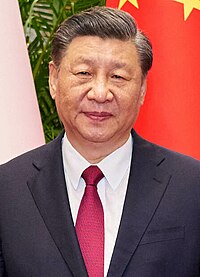
Back President d'a Republica Popular China AN رئيس الصين Arabic رئيس الصين ARZ Председател на Китайската народна република Bulgarian গণপ্রজাতন্ত্রী চীনের রাষ্ট্রপতি Bengali/Bangla Predsjednik Narodne Republike Kine BS President de la República Popular de la Xina Catalan Prezident Čínské lidové republiky Czech Folkerepublikken Kinas præsidenter Danish Staatspräsident der Volksrepublik China German
| President of the People's Republic of China | |
|---|---|
| 中华人民共和国主席 | |
 | |
 | |
| Office of the President of the People's Republic of China | |
| Style |
|
| Type | Ceremonial presidency [1] |
| Status | National leader level official |
| Reports to | National People's Congress and its Standing Committee |
| Residence | West Building, Zhongnanhai |
| Seat | Beijing |
| Nominator | Presidium of the National People's Congress |
| Appointer | National People's Congress |
| Term length | Five years, renewable with no-limit |
| Constituting instrument | Constitution of the People's Republic of China |
| Precursor | Chairman of the Central People's Government (1949–1954) |
| Formation | 27 September 1954 |
| First holder | Mao Zedong |
| Abolished | 1975–1982 |
| Deputy | Vice President |
| Salary | CN¥150,000 per annum est. (2015)[2] |
| President of the People's Republic of China | |||
|---|---|---|---|
| Simplified Chinese | 中华人民共和国主席 | ||
| Traditional Chinese | 中華人民共和國主席 | ||
| |||
| alternative name | |||
| Simplified Chinese | (中国)国家主席 | ||
| Traditional Chinese | (中國)國家主席 | ||
| |||
The President of the People's Republic of China, commonly called the President of China, is the state representative of the People's Republic of China, which on its own is a ceremonial office and has no real power in China's political system. However, since 1993, the post has been held by the general secretary of the Chinese Communist Party (CCP) and chairman of the Central Military Commission, who is China's de facto leader.
The presidency is a part of system of people's congress based on the principle of unified power in which the National People's Congress (NPC) functions as the only branch of government and as the highest state organ of power. The presidency is a state organ of the NPC and equivalent to, for instance, the State Council and the National Supervisory Commission, rather than a political office, unlike the premier of the State Council. Together with the NPC Standing Committee, the presidency performs certain heads of state functions. The president can engage in state affairs with the consent of the NPC Standing Committee. While the presidency is not a powerful organ in itself, since 27 March 1993, the president has concurrently served as general secretary of the Central Committee of the Chinese Communist Party (CCP) and chairman of the Central Military Commission (CMC), making the incumbent China's paramount leader and commander-in-chief.
The first state representative of the People's Republic of China was the chairman of the Central People's Government, which was established on 1 October 1949 by a decision of the Chinese People's Political Consultative Conference. It was replaced in Constitution in 1954 with the office of state chairman. It was successively held by Mao Zedong and Liu Shaoqi. Liu fell into political disgrace during the Cultural Revolution, after which the presidency became vacant. The post of chairman was abolished under the Constitution of 1975, and the function of state representative was bestowed on the chairman of the NPC Standing Committee. The office was reinstated in the Constitution of 1982 but with reduced powers and a stipulation that the president could not serve more than two consecutive terms. The term limits were abolished in 2018. Since 1982, the title's official English-language translation has been "president", although the Chinese title remains unchanged.[note 1]
- ^ "国家主席是什么样的国家机构?"What kind of national organ is the president"". People's Daily (official newspaper of the CCP) (in Chinese (China)). Chinese Communist Party News. 14 March 2013.
在我国,国家主席无实质、独立的权力,是"虚位"国家元首。"In our nation, the President does not hold substantive, separate power, and is ceremonial..."
- ^ Luo, Wangshu (20 January 2015). "Public Employees Get Salary Increase". China Daily. Archived from the original on 5 June 2019. Retrieved 4 November 2019.
Cite error: There are <ref group=note> tags on this page, but the references will not show without a {{reflist|group=note}} template (see the help page).
